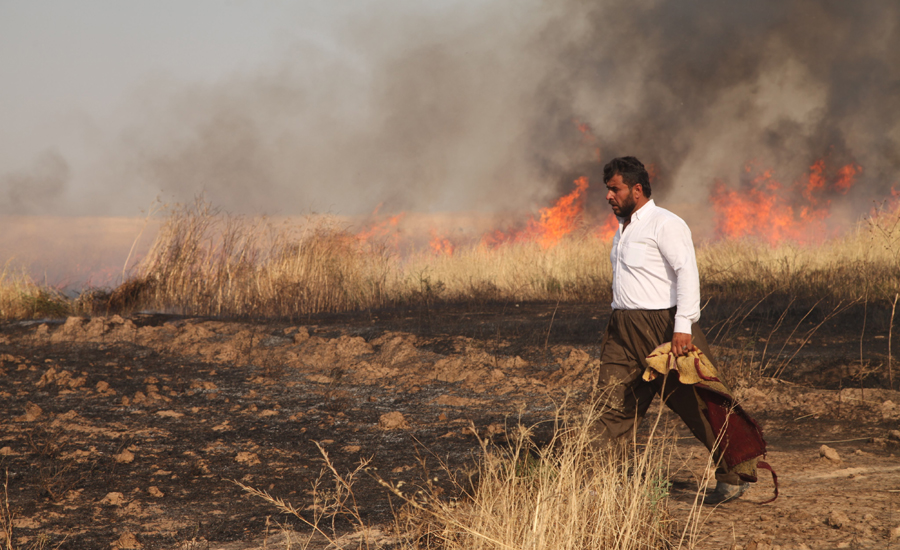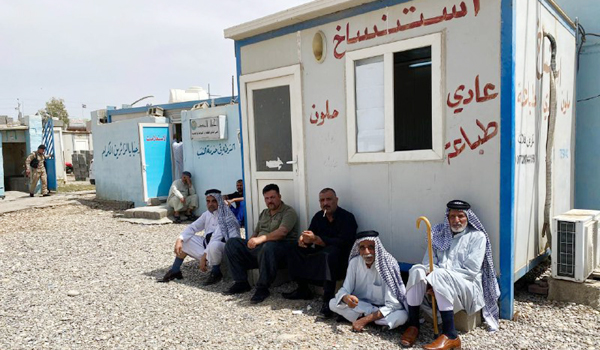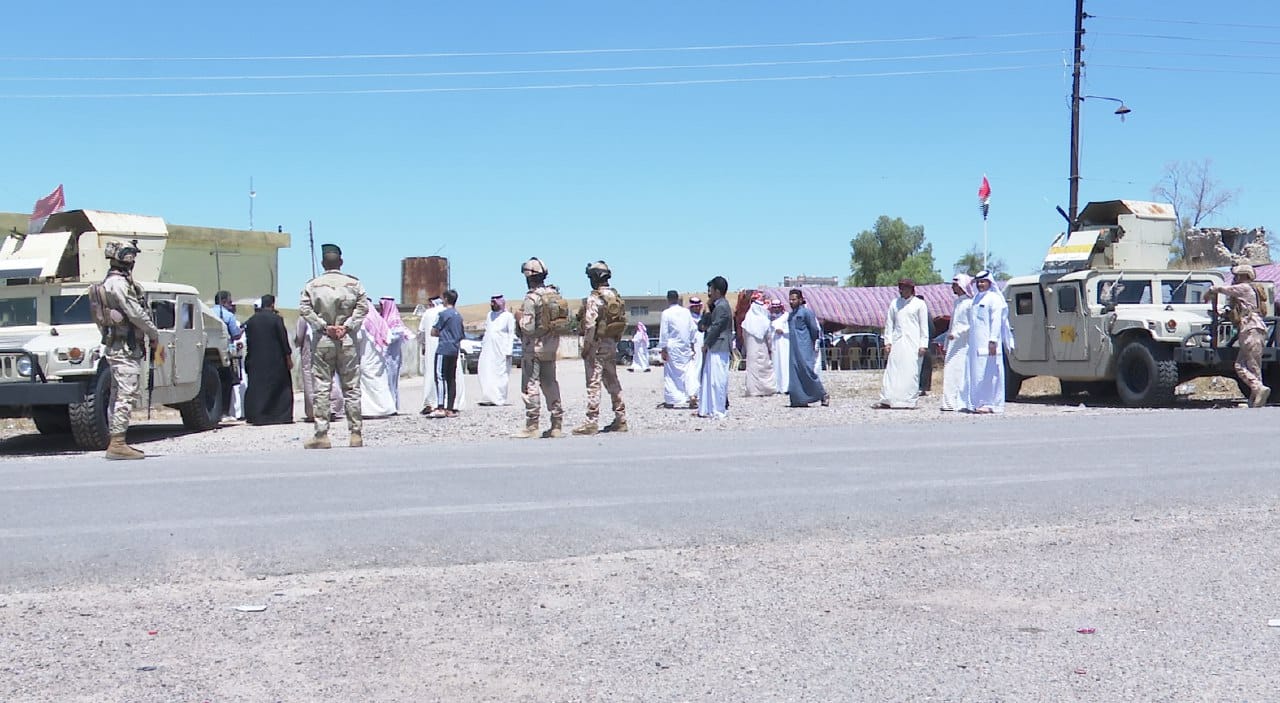The local government in Salah al-Din is standing idly by, failing to find solutions to the disputes between Kurdish and Arab farmers in several villages in Tuz Khurmatu district, occasionally escalated into tension and clashes.
The roots of the problem date back four decades or more, when thousands of hectares of agricultural land were confiscated from Kurdish and Turkmen farmers in several Iraqi governorates under the decisions of the dissolved Revolutionary Command Council during the rule of the Baath regime.
Later they were distributed to Arab farmers under contracts.
"I own 15 hectares of agricultural land that belong to my fathers and grandfathers, but Arab farmers have raided us and want to take it from us," Farhad Hamid, a farmer in the village of Tapasawz in Tuz Khurmatu district, told KirkukNow.
After the fall of the Baath regime led by Saddam Hussein in 2003, Farhad returned to his farmland, like thousands of other farmers who were able to reclaim their lands in Kirkuk, the Nineveh Plain, and Diyala. However, after federal government forces re-imposed control over the disputed territories in 2017, the Kurdish Peshmerga forces were forced to withdraw, leading to renewed conflicts.
"Since then, Arab farmers have continued to raid us and demand our lands, citing their agricultural contracts," Hamid added. "We have had clashes on more than one occasion, and they threaten us."
The clashes escalated last month, leading to police intervention to resolve the disputes. One of Farhad’s brothers was fined 1.5 million Iraqi dinars (IQD) by the court based on a complaint from Arab farmers.
According to the Iraqi constitution approved by the majority of voters in Iraq, the fate of the disputed territories must be resolved according to a three-stage roadmap, starting with normalization and then the census, to be followed by a local elections or referendum about its destiny to be part of Baghdad or Erbil, according to Article 140 that set the end of 2007 as a deadline for implementing these stages.
According to Article 140, each Arab family settled in the disputed territories must be paid 20 million dinars as compensation in case of return to their places of origin, with other compensation to be estimated such as the damage caused by the return.

Ahmed Marif, Director of Agriculture in Salah al-Din, stated, “We cannot resolve land ownership disputes between Kurds and Arabs. This is a political and legal issue. We cannot take any step without referring to the higher authorities.”
“Any decision issued, we will be obligated to implement as an executive body. Only the law can resolve this matter.”
At least 40 farmers in the village of “Tapasawz” suffer from problems related to land ownership, in addition to hundreds of other villages in several Iraqi provinces including the disputed territories.
The cancellation of contracts distributed under the Revolutionary Command Council requires the issuance of a law, not a decision by the government or a political agreement, according to members of the Iraqi Council of Representatives.
There is currently a draft law at the Iraqi parliament regarding the return of seized lands to their original owners, but deep disagreements between the Kurds and Sunni Arabs are delaying the approval of the draft law.
On October 29, clashes between a number of Kurdish and Sunni Arab representatives inside the Council of Representatives led to the postponement of the vote on the draft law.
Dara Sekaniani, a Kurdish member of the parliamentary legal committee, stressed at the time that the Sunnis were determined not to approve the draft law in the manner in which it was sent by the government.
The draft law includes the cancellation of eight decisions, but changes were made within the Council of Representatives, and at least eight other decisions were added.
Sekaniani says parliament has the right to make changes to the bill, “which have been changed so that its implementation will return the largest possible area of land to Kurdish and Turkmen farmers within the boundaries of the territories covered by Article 140 of the Iraqi constitution, including the decisions related to the territories located in Diyala, the Nineveh Plain, and Salah al-Din, in addition to Kirkuk province.”
Farmers remain desperate and in clashes as the parliament is drafting a law.
“We have resorted to many, but none of them have been able to solve our problem,” says farmer Farhad Hamid.
Sheikh Ghaleb, head of the al-Salihi tribe and a resident of the village of Tapasawz, said, “Arab farmers are not friendly. We live in danger every day, and they threaten our stability.”
“Passing the bill to cancel the Revolutionary Command Council’s decisions is the only solution to save us from this problem,” he added.

In contrast, Arab farmers deal with the issue based on the Revolutionary Command Council’s decisions and the contracts they have.
Last year, a number of Arab farmers held a press conference in Kirkuk on the issue of land ownership disputes. Ahmed Ghazal, a Shammar tribal sheikh, told KirkukNow, “We have official documents issued by the court and other relevant authorities; these lands belong to us, but the Kurdish families in these villages do not have any documents.”
KirkukNow was unable to obtain statements from Arab farmers in Tuz Khurmatu, but most Arab farmers in all disputed territories have registered lawsuits to claim agricultural lands or obtain compensation.
In 2022 alone, at least 300 Arab farmers from the governorates of Wasit, Diwaniyah, and Nasiriyah returned to Khanaqin district of Diyala province to register complaints in order to recover lands or obtain compensation.
In general, the desire to return and calls for compensation by the Arab settlers to Khanaqin and other disputed territories, including Kirkuk, emerged after the end of the war against the Islamic State in Iraq and Syria ISIS and the return of Iraqi forces in late 2017 to the disputed that was under the control of the Kurdistan Regional Government KRG forces since 2003.
In Tuz Khurmatu district, there are disputes over the ownership of 52 agricultural plots, each ranging in size from 20 to 40 donums (2-4 hectares).
Last year, Arab farmers succeeded in renewing contracts granted to them during the Baath regime and reclaiming six plots of land in the village of Hilewa in Tuz Khurmatu district.
Ali Jalal, the director of Tuz Khurmatu agriculture, said, "We cannot do anything about the court verdicts, so we have renewed the contracts of the farmers, and the land is now in their name as part of the agricultural plan for the current year."
In general, the departments of agriculture reject the renewal of any agricultural contract for the lands located within the disputed territories, but those who succeeded in renewing them are those who filed lawsuits and got verdicts from the courts.





